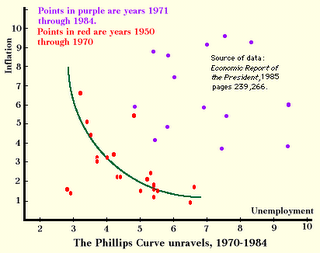
In the 1960's, economists believed a country could trade off unemployment and inflation along a fairly deterministic curve, the Phillips Curve. But there was a catch: once people knew that governments wanted to exploit the curve, it broke down. Why? Because the Phillips Curve depends on expectations; if workers know that the government's monetary policy is designed to raise wages, they'll demand higher wages, which in turn leads to inflation. But firms won't hire more people, since they have to keep raising wages to attract good people... voila, stagflation.
Phelps, of course, said it a lot better than that, which is why he has a Nobel Prize. Also, the illustration showing the dissolution of the Phillips Curve is borrowed from Ingimayne.com, which has a more technical discussion of the breakdown.
No comments:
Post a Comment